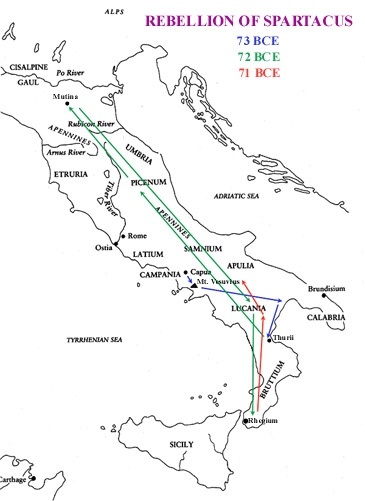
Slave and general of the slave revolt; d. 71 BC (?)
Spartacus was born in Thracia (Greece) and served in the Roman army. Details about his early life are not well documented, but it is believed that he left the army to build a bandit group and go on raids of his own. He was captured and sold into slavery.
Spartacus' documented life begins in Capua, a provincial city north of Naples (Italy), where Spartacus was trained as a gladiator. The Roman civilization operated many gladiatorial training schools throughout the empire, where prisoners of war and slaves were trained to perform for public entertainment. Using a special short gladiator's sword they were trained to fight each other or confront wild animals. The fight usually ended in the death of one of the combatants, unless the spectators indicated that clemency should be applied to the severely wounded defeated party.
In 73 BC Spartacus and 70 fellow gladiator trainees escaped from the training school and avoided capture by retreating to the upper slopes of Mount Vesuvius. They managed to defend their position against a military detachment and were soon joined by hundreds of runaway slaves and other country people trying to escape their debts.
Spartacus now showed extraordinary leadership and military genius. He used the time during which the Roman state prepared a new assault to set up a weapons manufacture and train his people in combat. When the Roman army arrived it was decisively defeated. A second army attack suffered the same fate.
Spartacus then moved into southern Italy. On the way his army grew to at least 90,000 men or more. New arrivals had to be trained and supplied with swords, and military discipline was tight.
In 72 Spartacus decided to take his army northward with the aim to escape from Roman encirclement and send his men home into their provinces. He traversed the length of Italy, defeating several Roman armies on the way and causing panic in the capital. Disunity amongst the various tribes of his army caused setbacks - the Germans and Belgians did not want to fight under the command of a Greek, marched off on their own and were promptly annihilated by the Roman army -, but by the middle of the year Spartacus and his men had defeated the last Roman army in their way, and the way was open for them to cross the Alps into freedom.
But the victorious slaves preferred life in civilized Italy to life in their home villages and refused to leave Italy. Spartacus decided to try and establish a new homeland in Sicily. He and his army fought their way back to the southernmost point of Italy. An arrangement with pirates to ferry the army across to Sicily fell through, and the men were encircled and besieged by eight Roman legions.
The encirclement appeared unbreakable, but through an audacious plan and outstanding military leadership Spartacus managed to break through and take his army north again. Again disunity caused severe losses; first the Gauls and then the Germans marched off on their own and were defeated.
Spartacus was a gifted and humane commander. He realized that his men were only capable of fighting but were not the material required for the establishment of a new society. Before the last battle he killed his horse in front of his men, saying that he would either have plenty of opportunity to get new horses from the defeated Romans or have no need for a horse any more. He fell in pitched battle. 6000 of his men, who fled in disarray through the countryside, were taken prisoner and crucified along the Appian highway.
Political movements of the 19th and 20th centuries honoured Spartacus as a man prepared to fight for the liberation of the oppressed. In Germany the Spartacus League ("Spartacusbund") was founded in 1916 as an offshoot of the Socialist Party and transformed into the Communist Party in 1918/1919.
